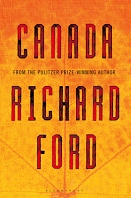Erstellt am: 4. 8. 2012 - 13:16 Uhr
Richard Ford's "Canada"
- Mehr Buchempfehlungen auf FM4
Richard Ford's Canada starts with a bang, the key events already given away in four short tantalizing sentences. "First, I'll tell you about the robbery our parents committed. Then about the murders, which happened later. The robbery is an important part, since it served to set up my and my sister's lives on the courses they eventually followed. Nothing would make complete sense without that being told first."
Badly planned
It's an invitation to read further but it's also a risk to give the plot away so soon. Yet this novel is not so much about the action. It is the story of the attempt of an older man to make sense of the sudden events of his childhood that turned several lives upside down. The narrator Dell Parsons, a man in his 60s, a retired school teacher, is strenuously trying to recreate the event that shaped his destiny when he was a teenager living in Montana. His father, an outgoing, crowd-pleasing former GI from the deep south and his mother, artistic-minded, alienated daughter of Jewish immigrants, incompetently rob a bank in North Dakota, and are almost immediately arrested and jailed, effectively orphaning 15 year old Dell.

Richard Ford
Badly planned, incompetently carried out and totally unnecessary. The robbery, initiated to pay off an insignificant debt, is almost inexplicable folly. The older Dell reconstructs the run up to the event like a witness in a court, trying to lay out the events simply as they happened and ruminating on why:
"I'll say this about my father: when he returned from the theater of war and from being the agent of whistling death out of the skies... he may have been in the grip of some great, unspecified gravity, as many GIs were. He spent the rest of his life wrestling with that gravity, puzzling to stay positive and afloat, making bad decisions that truly seemed good for a moment, but ultimately, misunderstanding the world he'd returned to and having that misunderstanding become his life."
A major shock
The 15 year old Dell evoked by the narrator is a sweet boy – a good-natured geek who likes bees and chess and performing well at school. He's attached to his parents – who he says seemed so "normal" but, as the son of a roving serviceman and a mother who wants to keep him apart from other local kids for fear of being "contaminated" by their mediocrity, he never feels normal. In the autumn he is due to start high-school - a chance, he believes, to cast roots and finally fit in. But then, before the summer out, comes the robbery and the arrest of his parents. Instead of starting school, Dell finds himself being driven by his Mum's friend Mildred north to Canada, out of reach of the juvenile authorities. It's a major shock:

Ecco
Richard Fords "Canada" ist im Ecco Verlag erschienen.
"Her spongy shoulders were shoved against my ear. You've had a time," she whispered. "Just 'cause their life got ruined doesn't mean yours does. This'll be a new start for you."... "I didn't want a new start," I said, my throat suddenly constricted again - with anger at her just saying that. "We don't always get to choose out starts... This is an adventure".
That is perhaps the key message of the novel – learning to play with the cards you are dealt without bitterness. Adventures do lay ahead – but not altogether pleasant, as young Dell works for Mildred's Harvard educated anti-establishment brother Arthur in his dilapidated hotel, with assistance from a Hitler-admiring native Canadian. A gentle boy, craving normality, is thrust into a world offering only uncertainty and violence.
I won't give away any more of the plot, well, with his first lines, Ford does a fairly good job of that himself - after the robbery, come the murders.
Yet more than the story-line, it's the masterful voice of Dell that delights in this novel. Richard Ford, Pulitzer prize winning author of The Sportswriter and Independence Day, is on top form here. The story is told slowly and carefully in precise, paired-down, honest language that is explicit and self-reflecting but not showy. There is an intensity of experience as Dell delves in the bygones in a way that is quizzical but never angry.
In Dell Parsons, Ford has created one of the most absorbing teenagers in American literature since Holden Caulfield.


